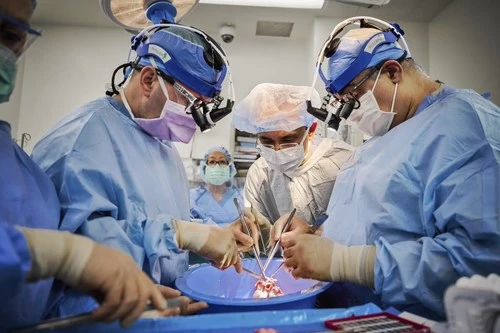

Successful Heart Xenotransplant Experiments at NYU Langone Set Protocol for Pig-to-Human Organ Transplantation.
<p>
&nbsp;A team at NYU Langone Health successfully transplanted two genetically engineered pig hearts into recently brain-dead humans in June and July, marking the latest advances toward addressing the nationwide organ shortage and developing a clinical protocol that would provide an alternative supply of organs for people with life-threatening heart disease, according to a press statement by the New York Institute.&nbsp;</p>
<p>
The surgeries, known as xenotransplants, were performed on Thursday, June 16, 2022, and Wednesday, July 6, 2022, at NYU Langone&#39;s Tisch Hospital. <a href="https://nyulangone.org/doctors/1356367676/nader-moazami" rel="nofollow">Nader Moazami, MD</a>, surgical director of<a href="https://nyulangone.org/locations/nyu-langone-transplant-institute/heart-transplantation" rel="nofollow"> heart transplantation</a> at the <a href="https://nyulangone.org/locations/nyu-langone-transplant-institute/heart-transplantation" rel="nofollow">NYU Langone Transplant Institute</a>, led the investigational procedures using hearts procured from a facility hundreds of miles away and transplanted into recently deceased donors maintained on ventilator support.</p>
<p>
The transplant surgeries were performed over several hours and heart function was monitored for three days. The first heart xenotransplant concluded on Sunday, June 19, 2022, and the second on Saturday, July 9, 2022. No signs of early rejection were observed in either organ and the hearts functioned normally with standard post-transplant medications and without additional mechanical support.</p>
<p>
The hearts were procured from pigs that had 10 genetic modifications, including 4 porcine gene &quot;knockouts&quot; to prevent rejection and abnormal organ growth as well as 6 human transgenes (&quot;knock-ins&quot;) to promote expression of proteins that regulate important biologic pathways that can be disrupted by incompatibilities between pigs and humans. No other investigational devices or medications were used in this NYU Langone Health study. The procurement, transport, transplant surgery, and immunosuppression were aligned with current clinical standards used in heart transplantation.</p>
<p>
&quot;Our goal is to integrate the practices used in a typical, everyday heart transplant, only with a nonhuman organ that will function normally without additional aid from untested devices or medicines,&quot; said Dr. Moazami. &quot;We seek to confirm that clinical trials can move ahead using this new supply of organs with the tried-and-true transplant practices we have perfected at the NYU Langone Transplant Institute.&quot;</p>
<p>
Alex Reyentovich, MD, medical director of heart transplantation and director of the NYU Langone Advanced Heart Failure program, said these latest advances in xenotransplantation move the field closer to realizing a new supply of organs for those facing life-threatening disease.</p>
<p>
&quot;These are the first steps in developing a deep understanding of the mechanical, molecular, and immunologic aspects of xenoheart transplantation and the feasibility of utilizing standard clinical practice and tools to do so,&quot; said Dr. Reyentovich.</p>
Prime Minister Narendra Modi arrived in Maldives on Friday as a part of his second…
The reduction in import duties on automobiles under the newly signed India-UK Free Trade Agreement…
Prime Minister Narendra Modi and his UK counterpart Keir Starmer shared a light moment during…
Prime Minister Narendra Modi lauded the signing of the landmark India-UK Free Trade Agreement on…
United Kingdom Prime Minister Keir Starmer on Thursday said that the UK-India FTA is the…
A Visiting Indian medical team on Thursday began treatment of patients injured in a fighter…